#manifesting 1989 tv announcement today...
Text






— STYLE (TAYLOR'S VERSION) (formerly known as 1989) design concept inspired by Kacey Musgraves' Star Crossed. Feat. Regular cover, Target version cover, Record Store Day Limited edition picture disc, and the tracklist.
#tswiftgraphic#taylor swift edit#dailytaylorswiftedit#dailytayloredits#tsgraphics#tswiftcreatorsnet#tscreators#tswiftedit#iseethisedit#taylor swift#my graphics#taylor swift 1989#1989#1989 taylor's version#1989 tv#taylor swift concept#manifesting 1989 tv announcement today...#by me
259 notes
·
View notes
Text
manifesting big tswift announcement today, plz be 1989 tv or second u.s leg 🥲 either way im scared
3 notes
·
View notes
Text
Cobra Kai’s Emmy Nomination Redeems its Rough Beginnings
https://ift.tt/3rc4aqH
Cobra Kai finds itself among television’s upper echelon with today’s 2021 Emmy nominations announcement, which named it as a nominee for Outstanding Comedy Series for January’s Netflix-debuted third season. The series, a decades-awaited sequel to The Karate Kid films, has seen its popularity increase exponentially after a migration from YouTube Premium to Netflix, on which the nominated season premiered. It’s quite the achievement when remembering the show’s less-than-auspicious 2018 launch.
The Emmy nominations highlight a second pandemic-altered year for the industry, further cementing the notion that the overwhelming majority of television’s heavy hitters now reside in the realm of streaming, rather than the airwaves. Notwithstanding a sole network sitcom straggler in Black-ish (ABC), the tonally-diverse comedy category proved no exception to that phenomenon, with Cobra Kai (Netflix) joining fellow streamers in Emily in Paris (Netflix), Hacks (HBO Max), The Flight Attendant (HBO Max), The Kominsky Method (Netflix), Pen15 (Hulu) and Ted Lasso (Apple TV+) for this year’s announced nominees. However, amongst this group, Cobra Kai’s path to this level was poetically serpentine, arguably making its nomination a sweeter achievement, win or lose.
Cobra Kai debuted back on May 2, 2018, widely perceived as an indulgent oddball nostalgia session. The 30-minute-set series manifested as a surreal continuation of the esteemed-but-long-dormant 1980s film franchise of The Karate Kid, which, decades earlier, had delivered a Crane Kick-dealt jolt to popular culture that spawned merchandise, catchphrases and surging memberships in dojos around the country off two entries in 1984 and 1986, respectively, only to lose momentum and marketability with the 1989 third film. The original franchise’s last big screen gasp, 1994 spinoff movie The Next Karate Kid, starred Hilary Swank as the new, angstier martial arts protégé to the returning sagely Mr. Miyagi, and performed abysmally, seemingly sealing the continuity’s end. That notion was further cemented with the 2005 passing of Miyagi actor Pat Morita. Indeed, even a 2010 reboot movie of The Karate Kid, which reinterpreted the primary sensei/student dynamic through Jackie Chan and young Jaden Smith, failed to revive the property. Therefore, it became a once-popular franchise that was discarded to a proverbial pop culture bin of ’80s relics like Porky’s and the Police Academy septet.
Consequently, The Karate Kid would be seen as a nostalgic punchline only referenced on occasion, notably in the 2007 music video by band No More Kings, titled “Sweep the Leg,” in which actor William Zabka fielded a tongue-in-cheek appearance as original movie bully Johnny. Likewise, the announcement years later of Cobra Kai as a revival television series—having corralled “where are they now?” level original stars Ralph Macchio and William Zabka—didn’t sound like anything that would generate more than some, “Look, it’s Daniel and Johnny—and they’re old!” kind of laughs amidst repeated film catchphrases before relegating the movie mythos back to its dormancy. Yet, the pièce de resistance to the show’s perceived kitsch was the very platform on which it would first reside, YouTube Premium, née YouTube Red, which was a lofty—some might say quixotic—attempt by the always-free Google-assimilated video giant to put original scripted content behind a paywall. Indeed, Cobra Kai seemed destined as a one-off curiosity that very few audiences—especially its initial Gen-X-tickling target—would even hear about, much less watch.
Read more
TV
Terry Silver’s Return Brings A Manipulative Villain to Cobra Kai Season 4
By Joseph Baxter
TV
Cobra Kai Season 4: What to Expect
By Gene Ching
Surprisingly enough, Cobra Kai managed to turn many influential critical heads upon its 2018 debut. While the series did indeed come out of the gate brandishing its own inherent brand of nostalgia, it also packs surprisingly substantial pathos—with Johnny’s aimless arrested development, Daniel’s family crises and the teenage troubles of Miguel, Samantha and Robby and the rest of the dojo gangs—that surpassed the poignancy of the films. While the series is categorized as a comedy, it surreptitiously carries itself as a widely-identifiable drama about unrealized dreams, the value of redemption, the unproductive absurdity of ancient rivalries and the difficult transition between generations. Indeed, fueled by the clear passion and adoration for the franchise from showrunners Jon Hurwitz, Hayden Schlossberg and Josh Heald, the series managed to resonate among the subset of consumers who actually paid for the mostly content-lacking YouTube service, which created a substantial amount of buzz, leading to even more visibility for the quickly-ordered second season upon its April 24, 2019 premiere.
However, even the mighty YouTube’s bottom line for its floundering premium endeavor could not be supported by just one hit series, even after an attempted 2019 Hail Mary pass to lure subscribers by temporarily lowering the paywall, which gave the premium-averse general public access to the hyped Cobra Kai for free. Yet, the move did very little to help the platform’s cause. Eventually, in a bizarre development, YouTube Premium made an unrealistically low offer to producing studio Sony Pictures Television for a third season, negotiating itself out of a renewal. The act was essentially the platform’s de facto cancelation of its only show that people actually watched, leaving the service to languish as the series—by this time a buzz-hyped hit—entered an auspicious free agency.
Netflix, of course, would quickly come to the rescue of Cobra Kai with a winning bid, even as its spendthrift glory days of wanton rescues of network castoffs and instant green-lighting of obscure projects had already passed even by this pre-pandemic point. It was a sound investment on a series that was riding serious momentum; an investment that would first pay dividends when the first two seasons were ported over to the streaming giant in August 2020, which yielded chart-topping success, notably evidenced by the catalog episodes’ topping of Nielsen’s Streaming Top 10—over fresher content, no less—by that October. Consequently, the eventual arrival of the unseen third season of Cobra Kai became a streaming event when—after two years tied up in the platform migration morass—it finally dropped on New Year’s Day 2021, after which Netflix reported it was viewed by 41 million households in its first 28 days—grain of salt over the mystery metrics notwithstanding.
cnx.cmd.push(function() { cnx({ playerId: "106e33c0-3911-473c-b599-b1426db57530", }).render("0270c398a82f44f49c23c16122516796"); });
Now, it seems that Cobra Kai’s navigation of odd obstacles has yielded a shot at the biggest prize that the industry can offer it: a Primetime Emmy for Outstanding Comedy Series. While the show has previously been within reach of Emmy statues in 2018 and 2019, in which it was nominated for the impressive stunt work on its fight sequences, today’s nod is its first substantive industry validation. While it remains to be seen if Cobra Kai will be able defend itself against the momentum of its prestigious, more-star-studded peak television-level competition, it has nevertheless arrived amongst the medium’s elite. Moreover, this acknowledgment from the ceremony, which will be held on Sept. 19, will only help to increase buzz for the already-teased Cobra Kai Season 4, which is expected to arrive on Netflix by the end of the year.
The post Cobra Kai’s Emmy Nomination Redeems its Rough Beginnings appeared first on Den of Geek.
from Den of Geek https://ift.tt/3hyFyW2
0 notes
Text
When the Wall fell: history of the Fall of Berlin Wall
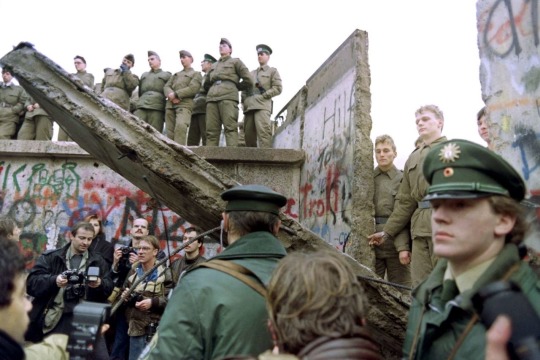
It was the night between 9th and 10th November 1989 and something epochal was happening. At 11pm the Wall which had divided Berlin for 28 years fell apart. It was the frontier lieutenant colonel Harald Jäger who, by his own initiative, gave the order to open a passage between East Berlin and West Berlin. It was the 9th November 1989, the Berlin Wall fell and the world started to change. A country started to be reunited with tears of joy, hugs and presents that German citizens gave each other; a reborn of a whole people and the sign that hoping is still possible.
Sighting history while it’s being made is not always possible, historians are those who individuate what was the events that made an era but in this case it was obvious that an epoch was at an end and one another was beginning. The 1989 was the end, or rather, the begin of the end of “The Short Twentieth Century” (as Eric J, Hobsbawm will have called in 1995 in an essay with the same title). Historians, the witness of the Fall and who participated in the destruction of the Wall had already understood it. All those astonished people who were watching the pictures of that memorable night, broadcasted by tv stations from all around the world had already known it. We’re sure about it today, after thirty years; we who have lived and known the consequences; because who has lived it remember these pictures that one can watch from TV or from YouTube.
Prior events

«[..] I think the Fall of Berlin Wall [...] happended especially due to Mikhail Gorbachëv’s politics of reformation that was announced during the 27th Congress of Comunist Party of Soviet Union (CPSU) and, in particular, due to Gorbachëv’s bad relations with German Democratic Republic (DDR)». If we should reconstruct a genealogy of the Fall of Berlin Wall, we could consider the Perestroika, that series of reforms aimed at the reorganisation of politics and social structure and the acceleration of economic development of Russia, wanted by the then General Secretary of the CSPU Mikhail S. Gorbachëv, carried out since the middle of the 80s but which started to fail by the end of the decade. This reforming politics was what made possible the huge manifestation in Leipzig in October 1898, raised after the substitution of the former leader of GDR Erich Honecker with Egon Krenz due to his reluctance to Perestroika, which Gorbachëv wanted to extend to other Satellite States of USSR between 1986-1989. Indeed, it was because of a declaration made by the CSPU leader after he could see himself GDR leader’s perplexities during celebration for the 40th anniversary of the foundation of the Deutsche Demokratische Republik that Hocker was ousted.
Leipzig manifestation inflamed due to the substitution of Hocker but, in virtue of Perestroika principles, the USSR didn’t send the army to stifle the riot. Still on the basis of the same principles, which aimed to a relaxation of the control on Soviet Union territories, Hungary could open its frontiers with Austria in 1989. That helped the migration of German citizens from East Berlin to West Berlin: the rise of the Wall, happened between 12th and 13th August 1961, was decided to contain the moving of German people, especially of the most educated and specialised workers, to the more democratic and wealthy West Berlin. That was another reason behind Leipzig manifestation. Thus, on 7th November 1989, SED general secretary, Krenz, and the minister of Foreign Affair, Oskar Fischer, informed the USSR ambassador, Vyakheslov Kakhamosov, about the new expatriation laws which included the creation of a new special checkpoint. Moscow authorities gave their permission on November 9th and Günter Schabowski, an official of the SED, organised a press conference for the same night, whose purpose was to communicate the new norms in terms of expatriation. Therefore, Günter Schabowski didn’t attend the Politubüro council concerning the new law.
The fact

«The fall of the Berlin Wall [...] was one of the few turning points in history that journalists not only witnessed but helped the cause». Indeed, Günter Schabowski was stumped by three journalists in particular, who asked him questions to which he couldn’t know the answers or pull information from that incomplete press communication he was given. Those journalists were Peter Brinkmann from the German Bild, Krzysztof Janowski from the American television network Voice of America, who asked him if the new legislation allowed or not travels between East and West Berlin, from which derived a positive answer from an even more confused Schabowski, and the Italian Riccardo Herman, who asked him from when these new norms were effective and Schabowski answered «as far as I know… effective immediately, without delay».
According to Schabowski’s declaration, it was possible to cross the Walk from that moment: a huge crowd poured out to the border.

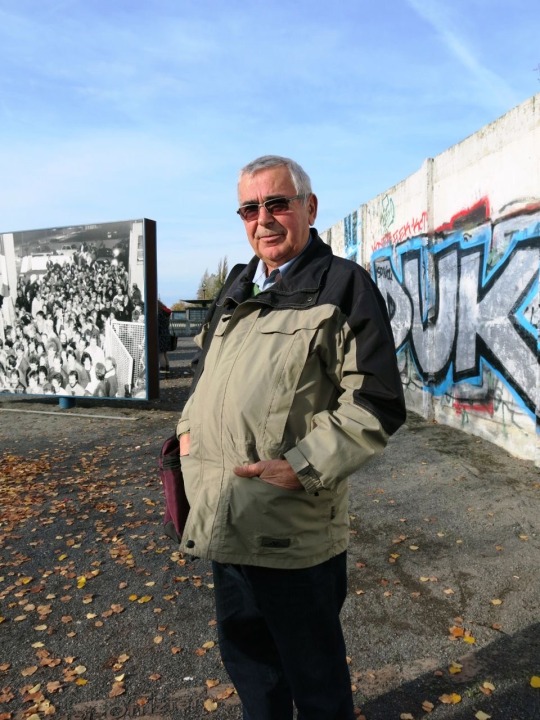
Working in service was the lieutenant colonel Harald Jäger. When he saw all these people, he rushed to his supervisors, who gave him the order to let pass only those who had the right documentation. At 20 pm the news broadcast went on the air which delivered the news about the new norms and about the possibility of crossing the border. This news went so viral that further people added to those who were already there waiting; so that Jäger called his supervisors again: the orders were to let pass who were creating disorder but the people there understood what was happening and started to riot. At 11 pm, the situation was disastrous and Lieutenant Colonel’s supervisors didn’t know what to do. Then Jäger gave the order to open a gate on the Wall that divided the German capital and citizens joined the soldiers. The Berlin Wall fell: opened the gate, relatives and friends met for the first time in 30 years. With a great emotion was made the history.
After 25 years that night, Harald Jäger will have told to the British newspaper The Indipendent: «We stood there and watched our citizens leaving en masse. These were our people. We cried. We felt betrayed by our superiors. It was the terrible realisation that not only the system and our leaders had failed. We had too[...] The crowds won us over with their euphoria, we realised that they were overjoyed and our tears of frustration turned to those of joy.»
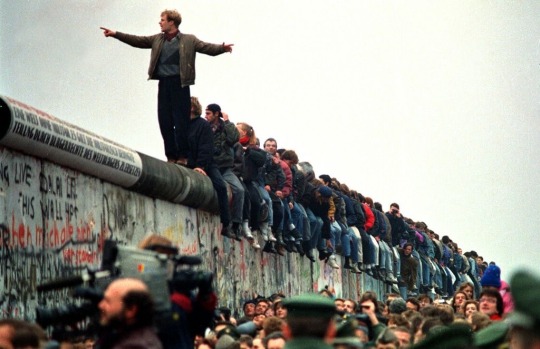
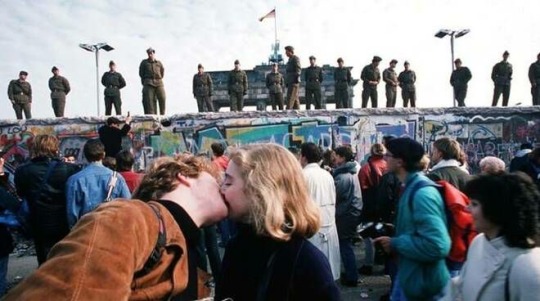
No one in Russia expected what could have happened that night, Gorbachëv neither, who chose to do nothing to prevent the Fall, nor to do something later. Often, in his memoir and interviews, he remembers that they «had taken every possible step to ensure that the process was peaceful, did not go against our country’s interest or threaten European peace in any way» and to the Russian magazine Russkaya Gazeta, to celebrate the 25th anniversary of the Fall, he told In the summer of 1989, neither Helmut Kohl nor I anticipated, of course, that everything would happen so fast. [...] This happens in history: it accelerates its progress. It punishes those who are late. But it has an even harsher punishment for those who try to stand in its way. It would have been a big mistake to hold onto the Iron Curtain. That is why we didn’t put any pressure on the government of the GDR When events started to develop at a speed that no one expected, the Soviet leadership unanimously [... ] decided not to interfere in the internal processes that were under way in the GDR, not to let our troops leave their garrisons under any circumstances. I am confident to this day that it was the right decision».
Actually, the then General Secretary of the CPSU wasn’t immediately informed on what was happening in Berlin on the night of 9th November, as his spokesman, Andrey Gartsov, confirmed later, because «As the situation in Berlin was developing chaotically, no one in his circle resolved to wake the General Secretary and inform him of the event, which on the face of it did not present any threat to national security. When he was finally told that a street demonstration had forced the East German authorities to open the border checkpoints with West Berlin during the night, he said, “They did the right thing.”»
The consequences
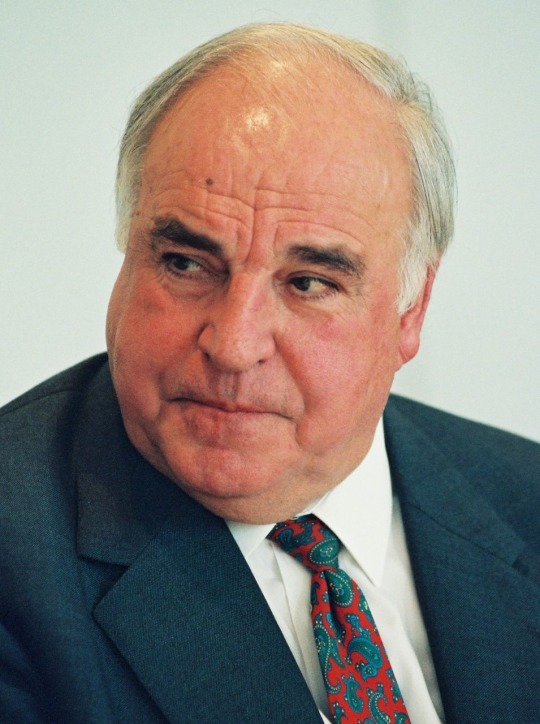
The Fall of Berlin Wall shook up the assets of European territories of those years: if it was set out towards preserving the identities of Germany and Warsaw Treaty at first, with the support of François Mitterand’s France and Margaret Tatcher’s UK, things went differently and Germany got back to being an united nation. Above all, it was for the contribution of the chancellor of West Germany, Helmut Kohl, that the unifications happened. Kohl managed to persuade the Deutsche Bundesbank to equiparate the value of the Deutsche Mark of East Berlin to that of West Berlin, so that was possible to promulgate a Treaty on Monetary, Economic and Social Union, that came into effect on July 1st: that was the first step to German unification.
Negotiations between the States kept going until the Treaty on the Final Settlement with Respect to Germany was signed by two Germany and by France, UK, USA and USSR. Germany is now a united nation with full independence. The German unification, moreover, became the basis for a new European Union.
On the other side, in Soviet Union, the Fall of Berlin Wall was the exploit of an already saturated system: by the begin of 1989, economic reforms of Perestroika were to fail, since then shortly after the rationing system was introduced and the Congress of People Deputies divided into communists and radical reformists in June, consequently the party-state lost the control on events; crisis intensified in August with the fall of Warsaw Pact: the Fall of Berlin Wall was the exploit and accelerated the process of crisis of the Soviet Union, already begun by the behaviours Gorbachëv kept at the end of his mandatory. At the end of 1991, the USSR fell apart, as well its ideology and cultural schemes that had kept united the Soviet Union since that moment,
If the Fall of Berlin Wall was a starting point for Europe, it started a period of political, social, economic and identity crisis and important transformation in Russia and in the former countries of Soviet Union. A sense of loss and chaos expanded, which swept over the culture as well, already on the way of post-modernism and of the crisis of the central role of literature.
Viviana Rizzo @livethinking
Article in Italian language here
Source
CAMPANELLI, Federica, “La caduta del Muro di Berlino: caduta di un simbolo” in Focus Italia, web, 11.08.2019, https://www.focus.it/amp/cultura/storia/il-muro-di-berlino-caduta-di-un-simbolo (retrieved on 9th November 2020)
GRACHEV, Andrei, “The world without the Wall” in Russia Beyond, web, 11.19.2020, https://www.rbth.com/literature/2014/11/19/the_world_without_the_wall_41515.html (retrieved on 9th November 2020)
KÒRSHUNOV, Maxim,“Mikhail Gorbachev: I am against all walls” in Russia Beyond, web, 10.16.2014, https://www.rbth.com/international/2014/10/16/mikhail_gorbachev_i_am_against_all_walls_40673.html (retrieved on 9th November 2020)
IL POST, “La caduta del Muro di Berlino, 30 anni fa” in Il Post, 11.09.2020, https://www.ilpost.it/2019/11/09/la-caduta-del-muro-di-berlino/amp/ (retrieved on 9th November 2020)
PANIEV, Yuri, "Quel nove novembre che cambiò la storia" in Russia Beyond, web, 11.09.2014, https://it.rbth.com/societa/2014/11/07/la_caduta_del_muro_33343 (retrieved on 9th November 2020)
PATERSON, Tony, “Fall of the Berlin Wall: the guard who opened the gate -and made history” in The Indipendent, web, 11.07.2014 https://www.independent.co.uk/news/world/europe/fall-of-the-berlin-wall-the-guard-who-opened-the-gate-and-made-history-9847750.html (retrieved on 9th November 2020)
ROMANO, Sergio, “La caduta del Muro di Berlino e le sue conseguenze” in ISPI. Istituto per gli Studi di Politica Internazionale, web, 11.08.2020, https://www.ispionline.it/it/pubblicazione/la-caduta-del-muro-di-berlino-e-le-sue-conseguenze-24323 (retrieved on 9th November 2020)
WALKER, Marcus, “The fourth man: who prompted the Fall of the Berlin Wall?” In Wall Street Journal, web, 11.05.2014, http://blogs.wsj.com/brussels/2014/11/05/the-fourth-man-who-prompted-the-fall-of-the-berlin-wall/?mod=WSJBlog&mod=brussels (retrieved on 9th November 2020)
YEGOROV, Oleg, “How did the Soviets react to the fall of the Berlin Wall?” in Russia Beyond, web, 11.09.2019, https://www.rbth.com/history/331253-berlin-wall-fall-gorbachev-ussr (retrieved on 9th November 2020)
Credit pictures to their respective authors
0 notes